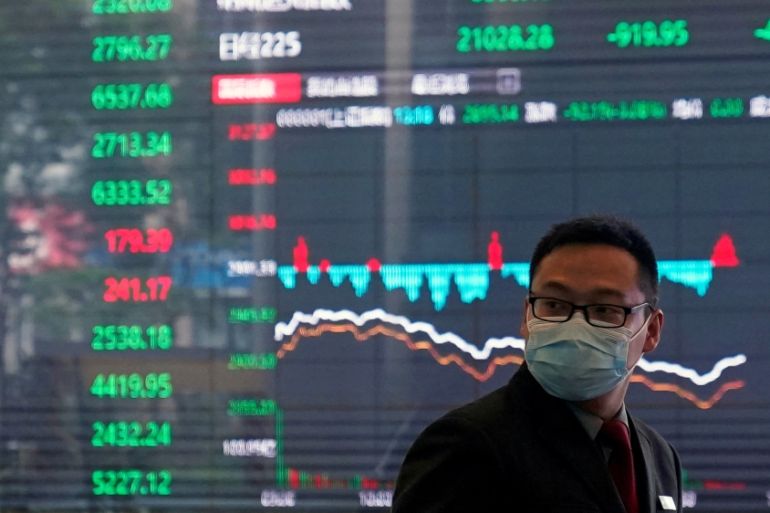On a high: Stocks, oil rally after $2 trillion US stimulus deal
But analysts say euphoria will fade if there is no end in sight to coronavirus pandemic.

Shares across Asia and Europe rallied on Wednesday as the United States Senate approved a $2 trillion aid package to help firms and households cope with the fallout of the coronavirus outbreak. Oil and gold prices also rallied.
US President Donald Trump’s administration reached a deal late on Tuesday with Senate Democrats to boost spending and offer tax breaks, further increasing gains in share prices over the last two days as investors anticipated the deal.
Keep reading
list of 3 itemsUS regulator moves to help investors affected by COVID-19
Rebound! Dow closes up 2,100 points – biggest gain ever
Optimism lifted markets again on Wednesday as Japan’s Nikkei surged 8 percent to their highest level in two weeks, posting its biggest daily gain since 2008. Chinese blue chips climbed 2.82 percent and MSCI’s Asia Pacific Index rallied 9.7 percent.
Australia’s S&P/ASX 500 gained 5.54 percent while South Korea’s benchmark index climbed 5.71 percent.
In Europe, stocks across London, Paris and Frankfurt were up as the Stoxx Europe 600 Index gained 2.9 percent.
The gains followed the biggest percentage jump on the US Dow Jones industrial average since 1933 – it surged 11.37 percent on Tuesday. It was the Dow’s largest-ever one-day point gain.
But analysts are sceptical as to whether the recovery in share prices is sustainable, as travel lockdowns and closed shops threaten to wipe out economic growth.
Stephen Innes, Asia Pacific market strategist at AxiCorp, told Al Jazeera that the US stimulus package will help businesses and consumers in the next few months but “how euphoria is going to last, I don’t know”.
“This week we get a pass [because of the stimulus], but next week, what happens if COVID-19 [cases] rise again?” he asked.
“The Fed can print more money, but if nobody’s gonna spend it … I can’t see how the market is going to sustain this sort of rally,” Innes added.
Despite the rise in Asian shares, US stock index futures slipped lower on Wednesday, before recovering some lost ground.
Details of the $2 trillion stimulus plan were scarce, although cheques to US citizens, tax deferments, loans and aid to small businesses as well as unemployment insurance were being negotiated.
“It’s good that they [the US administration] are delivering something, but it’s unlikely to reverse the damage that the US economy has already seen,” Robert Carnell, chief economist and head of research for Asia Pacific at ING, told Al Jazeera.
“Hopefully some of these measures are going towards healthcare,” he said, adding that small businesses and employees should also receive aid as widespread lockdowns continue to affect employment numbers and the ability to meet rent payments.
The US House of Representatives will still need to agree to the bill.
Going forward, a continuing rally in shares will depend on the duration of travel and movement restrictions as well as how quickly cases increase, Danny Wong, chief executive at Kuala Lumpur-based fund Areca Capital, told Al Jazeera.
“Markets have been sold down so badly, we’re seeing a rebound on and off. It is yet to be seen whether or not it is sustainable,” he said.
If the spread of the virus is not contained, Wong opined that there could be more downside for financial markets.
More than 17,100 people have died from COVID-19 and some 414,277 people have been diagnosed, according to data collected by Johns Hopkins University.
Noting the growing number of cases, ING’s Carnell said he would not be rushing to buy riskier assets such as stocks. “Any further rally is likely to be short-lived,” he said.
Gold extended its gains for the third straight day, rising to its highest level in about two weeks as the spot gold price climbed 0.9 percent to $1,624.18 an ounce.
Oil prices also continued to rise on US stimulus hopes, with US crude up by 2.5 percent to $25.10 a barrel and Brent crude oil rising 1.8 percent to trade at $27.64 a barrel.
The US dollar held firm against the Japanese yen at 111.17 to a dollar.